The Crucial BX200 (480GB & 960GB) SSD Review: Crucial's First TLC NAND SSD
by Billy Tallis on November 3, 2015 9:00 AM ESTMixed Random Read/Write Performance
Most real-world use consists of a mix of reads and writes, and interleaving the two often poses a particular challenge to drive controllers. This mixed random access test is conducted across a 16GB span of the drive, with a queue depth of 3.
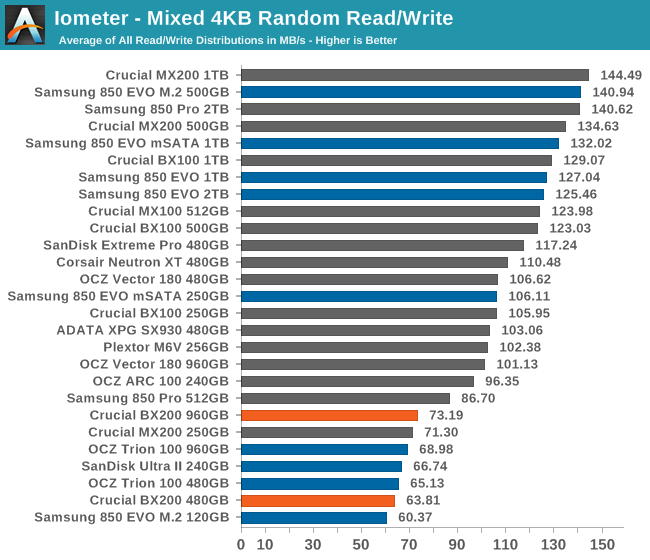
The BX200's reasonable read speeds are apparently able to compensate for the write performance enough to keep at least the 960GB BX200 out of last place for the mixed random test, but the 480GB only manages to surpass a 120GB drive.
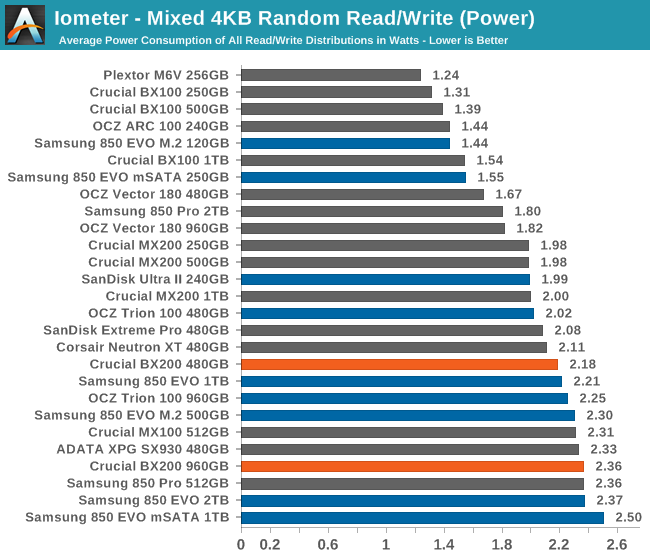
The power draw is even more mainstream than the performance, because despite being inefficient the BX200 isn't unreasonably power hungry in an absolute sense.
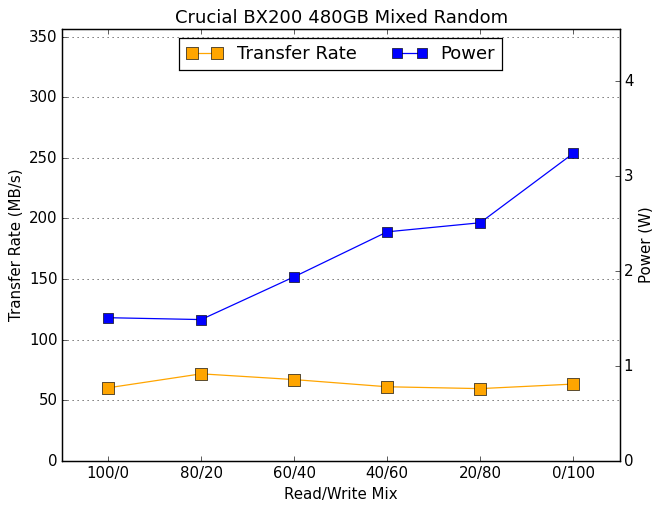 |
|||||||||
| Default | |||||||||
Slow and steady doesn't win the race here. Most drives gain speed near the end of the test for the write-heavy portions, but the BX200 gains no performance as the power consumption climbs. It doesn't have the slight bathtub curve shape in the middle the way the Trion 100 does, which is how it keeps pace even without the boost at the end.
Mixed Sequential Read/Write Performance
At either end of this test, when the workload is heavily skewed toward either reads or writes, most drives perform well. In between, performance typically suffers greatly, and that's where the winners and losers of this test are usually determined. Anything that's duplicating or transforming a large amount of data on the drive will produce I/O patterns similar to this test. Creating a System Restore snapshot, backing up files to a different location on the same drive, and file compression can all produce interleaved reads and writes of large blocks of data, though not necessarily fast enough to be limited by the drive's performance. Heavy multitasking can add up to a mixed workload.
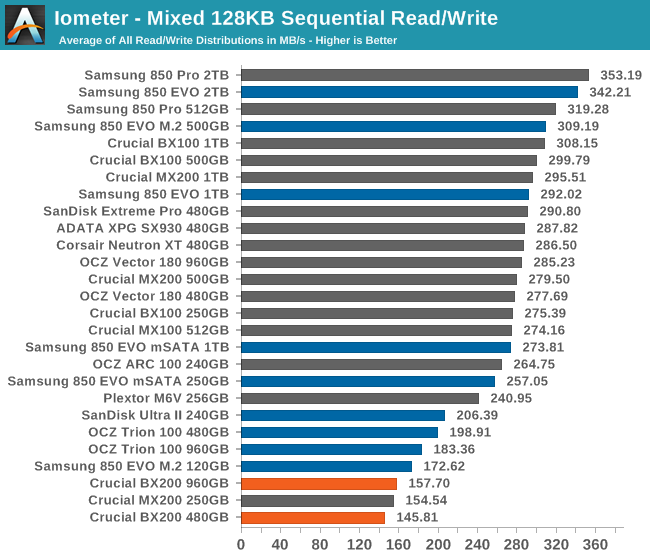
With average read speeds and poor write speeds, the BX200 is in last place for the overall average, since the competition didn't have any acute weaknesses.
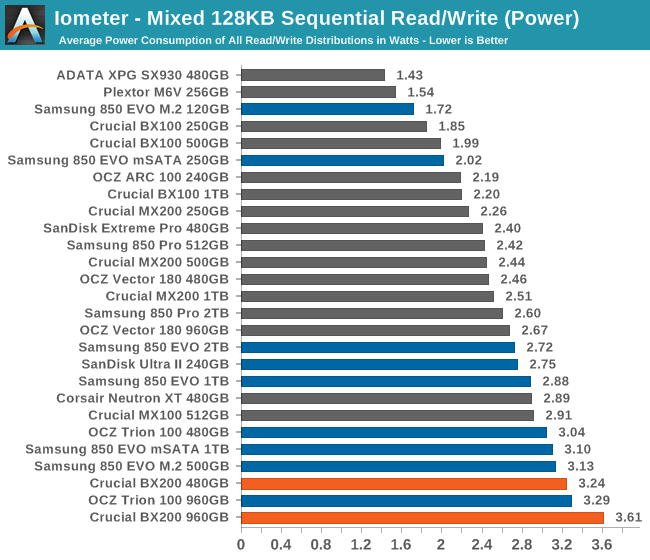
Average power consumption is once again high, and the 960GB is a particular outlier.
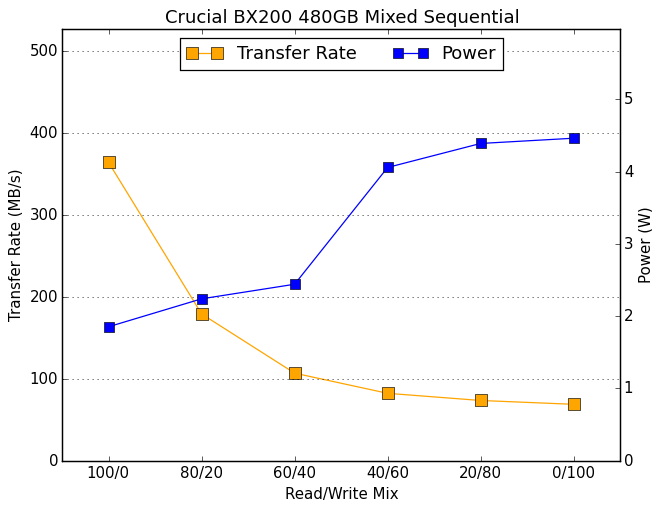 |
|||||||||
| Default | |||||||||
The graph of performance as more writes come into the mix shows just how quickly things get bad. There's a big jump in power consumption once writes are more common than reads, and the drive is almost as overwhelmed at 40/60 as it is for the pure writes.










85 Comments
View All Comments
extide - Tuesday, November 3, 2015 - link
You guys made a typo on page 8, under "Mixed Sequential Read/Write Performance" -- you duplicated "duplicating" hehBilly Tallis - Tuesday, November 3, 2015 - link
Ironic. Thanks.NeonFlak - Tuesday, November 3, 2015 - link
1tb Mushkin Reactor for less than $300 any day over this.MikhailT - Tuesday, November 3, 2015 - link
Is it me or is Crucial messing up lately with regressed successors? MX100 was great but MX200 was not that great and BX100/BX200 is even worse. It would've been better for them to just keep MX100 and drop prices over time.Crucial is basically just convincing me to switch to Samsung next time.
leexgx - Wednesday, November 4, 2015 - link
BX100 was very good for laptops, very low power use even when under loadBX200 is slower and use crap load more power , the TLC drives are just not worth the £10 cheaper price
LarsBars - Tuesday, November 3, 2015 - link
I've heard AnandTech say in the past, "It doesn't matter which brand of SSD you go with- just that you go with SSD."It looks like the BX200 means we need to be more vigilant about which SSDs we buy.
JimmiG - Wednesday, November 4, 2015 - link
It wouldn't be terrible if it was a bit cheaper. If the price drops over the next couple of months (which usually happens with SSD's), it would be great as a "secondary SSD", especially the 960GB model. However at the current prices, you're better off paying a tiny bit more for much better performance and endurance.Hulk - Tuesday, November 3, 2015 - link
I don't understand. Same endurance as the BX100 series using the same process size yet this is TLC vs. MLC for the BX100?While the performance is not great I could see this for media storage if the price is right. And by right I mean $200/TB.
Billy Tallis - Tuesday, November 3, 2015 - link
The endurance ratings for warranty purposes are only loosely connected to the actual P/E cycle count, and are usually pretty conservative. Plus, the BX200 does have the benefit of more sophisticated error correction.jabber - Tuesday, November 3, 2015 - link
Time to buy up the clearance BX100s!